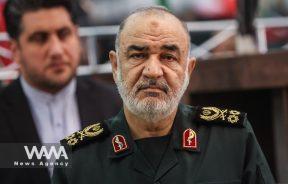Iran’s Leader Threatens America: “You Strike, We Strike”
WANA (Feb 07) – In the world of politics, sometimes a single statement can hit like a powerful missile—breaking through diplomatic barriers and shifting power dynamics. Today, in a meeting with Air Force commanders, Iran’s Supreme Leader responded to the latest U.S. remarks and sanctions with a stance that was not only directed at the Trump administration but also sent a direct message to regional and international actors: “If you threaten, you will be threatened. If you act, you will receive a response in kind.”
This was not just a reaction but part of a historical pattern that underscores how pressure and negotiations from a position of dominance have consistently failed against Iran.
The U.S., particularly under Trump, pursued a maximum pressure strategy, assuming it could bring Iran to its knees and force it into negotiations where Washington would be the sole winner. However, the nuclear deal (JCPOA) experience showed that Iran has already walked this path and remembers its outcomes well.

The Supreme Leader of Iran, in a meeting with a group of Air Force and Air Defense commanders – Iran 07. Feb. 2025- Leader office/ WANA News Agency
“We negotiated (with the U.S. and the West), we made concessions, we backed down (from our rights), but we didn’t achieve the intended result. The same agreement (JCPOA), despite all its flaws, was violated by the other side. They tore it up. Negotiating with such a government is neither wise nor honorable.” — Iran’s Supreme Leader.
In his speech, Ayatollah Khamenei stressed that negotiations with the U.S. would not resolve Iran’s economic challenges. Given Washington’s history of reneging on commitments, engaging in talks would be futile.
Iran’s resistance to external pressure is not new. During the unrest in 2022, many expected the Supreme Leader to soften his stance and announce policy shifts. However, in a speech at a military academy, not only did he refuse to retreat, but he also firmly stated that the U.S. and Israel were behind the riots. By exposing the West’s role in fueling the unrest, he effectively dismantled their regime-change agenda.
#Iran ‘s Supreme Leader:
“#Negotiating with the #US is not intelligent, rational, or honourable, and it does nothing to resolve the country’s issues. The reason? Experience!
In the 2010s, we negotiated with the U.S. and several other countries for about two years, leading to an… pic.twitter.com/tGJHp0WRI1— WANA News Agency (@WANAIran) February 7, 2025
Despite pressure from certain reformist figures and pro-Western factions urging direct negotiations with the U.S., Iran’s leadership resisted both internal and external pressures. Meanwhile, Trump’s contradictory and vague messages failed to alter Tehran’s course.
Iran maintained that as long as Trump continued using the language of threats and failed to present a clear plan that considered Iran’s interests, there was no reason to rush into talks. Netanyahu’s visit to the U.S. and his discussions with Trump and other officials made it clear that Washington had no real plan for reconciliation or normalization regarding Iran.
Iran’s Response: “We Are Neither Saudi Arabia Nor a Defeated Nation”
For years, the U.S. has attempted to pressure countries like Iran into submission through economic sanctions and military threats. However, Iran has consistently demonstrated that it does not leave threats unanswered—or that it turns them into opportunities. “The Islamic Republic is neither Saudi Arabia nor a weak country whose fate can be changed with political maps drawn on paper.”

Negotiations with the U.S. Will Solve Nothing
WANA (Feb 07) – The Supreme Leader of Iran, in a meeting with a group of Air Force and Air Defense commanders, emphasized: “The experience of the JCPOA has shown that negotiations with the U.S. will solve nothing.” Ayatollah Khamenei, Commander-in-Chief of the Armed Forces, addressing senior officials and personnel of Iran’s Air Force […]
Iran has shown resilience in the face of pressure while also striking back hard when necessary—from the attack on Ain al-Asad airbase following the assassination of General Soleimani to the downing of the Global Hawk drone, one of the U.S.’s most advanced military assets.
Many analysts argue that negotiations could reduce tensions, but the key question remains: Is a one-sided negotiation really a negotiation? The Supreme Leader emphasized that Iran has learned from past talks and will not repeat the same mistakes.
In this speech, Iran’s leadership directly challenged U.S. policies, reaffirming the country’s role as an independent and influential player on the global stage.
If Washington’s goal was to force Iran into negotiations through sanctions and threats, it has now received a clear response: “Threaten, and you will be threatened. Act, and you will receive a response.” This shift is what has disrupted Washington’s calculations, forcing it to rethink its approach toward Tehran.













